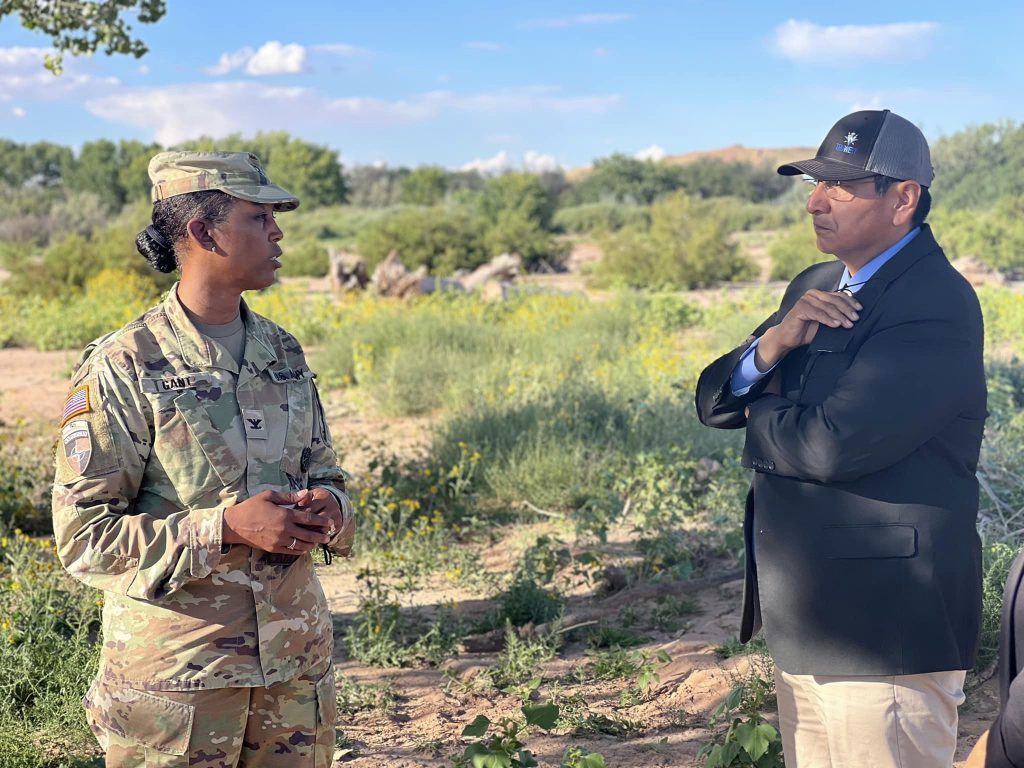
Jonathan Nez, right, serves as President of the Navajo Nation. Photo: Navajo Nation Office of President and Vice President
The Navajo Nation
Office of the President and Vice President
FOR IMMEDIATE RELEASE
September 19, 2022
Navajo Nation confirms three additional cases of Monkeypox
WINDOW ROCK, Arizona – On Monday, the Navajo Department of Health and the Navajo Epidemiology Center issued a Health Advisory Notice to inform the Navajo people of three new confirmed cases of Monkeypox, which brings the total number of cases to four on the Navajo Nation. The three recent cases involve individuals that reside in the eastern, central, and western Navajo agencies – in each case, it appears that the virus was contracted off of the Navajo Nation. The first Monkeypox case on the Navajo Nation was confirmed in August.
In July, Navajo Nation President Jonathan Nez established a Monkeypox Preparedness Team tasked with monitoring, planning, and coordinating precautionary efforts to address Monkeypox, which was spreading across the country at the time. In August, President Nez and Vice President Myron Lizer issued a letter through the Navajo Nation Washington Office to U.S. President Joe Biden and U.S. Secretary of Health and Human Services Xavier Becerra, requesting that Monkeypox vaccines be prioritized for tribal communities. At the end of August, vaccines were received at each of the Navajo health facilities.
“We have been taking a proactive approach to prevent the spread of Monkeypox on the Navajo Nation. We recently secured doses of the Monkeypox vaccines and they are now available to the Navajo people at each of our healthcare facilities. As cases of Monkeypox continue to gradually spread across the country, our public health officials continue to push back and urge our people to be very cautious,” said President Nez.
According to the Health Advisory Notice, a person may take five to 21 days to develop symptoms after exposure to Monkeypox which may include a fever, malaise or general feeling of illness, headache, sometimes a sore throat and cough, and lymphadenopathy or enlarged/swollen lymph glands/nodes. Individuals often experience rashes on the face, inside the mouth, and other parts of the body including the genitals in the later stages – this is also when a person is most contagious.
Monkeypox is spread through skin-to-skin contact with infectious rashes, scabs, or bodily fluids, through contact with respiratory secretions, or by touching objects, fabrics, and surfaces that have been used by someone with Monkeypox. It also spread through sexual activity/intercourse, hugging, massaging, kissing, or prolonged face-to-face contact.
The Health Advisory Notice states that if you are sick with Monkeypox, to isolate at home, stay away from other people and pets, and to contact your health care provider for testing, care, and treatment. Vaccinations are recommended for people with close personal contacts of someone with Monkeypox. Contact your primary care physician for further vaccine recommendations.
For more information regarding Monkeypox contact your local health provider and visit the Centers for Disease Control and Prevention webpage https://www.cdc.gov/poxvirus/monkeypox/ and Navajo Department of Health webpage https://ndoh.navajo-nsn.gov/.
Indian Health Service Announces New Deputy Director for Quality Health Care and Enterprise Risk Management (Indian Health Service)
Federal Emergency Management Agency (FEMA)
White House Office of Management and Budget (Joe Biden Administration)
Tuba City Regional Health Care Corporation (Arizona, Navajo Nation)
Oklahoma City Indian Clinic (OKCIC)
Indian Health Service (Department of Health and Human Services)
Navajo Nation Town Hall (Arizona, New Mexico, Utah)
Navajo Nation (Arizona, New Mexico, Utah)
Tribal organizations statement on advance appropriations for Indian Health Service
Indian Health Service Statement on Advance Appropriations (Department of Health and Human Services)
Indian Health Service (Department of Health and Human Services)
Indian Health Service (Department of Health and Human Services)
Navajo Nation (Arizona, New Mexico, Utah)
Indian Health Service (Department of Health and Human Services)
